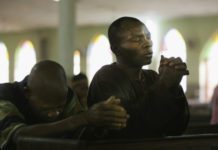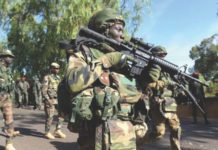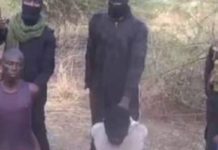By BosNewsLife Africa Service

JOHANNESBURG, SOUTH AFRICA (BosNewsLife)– Nelson Mandela, who became South Africa’s first black president, has died at age 95. The elderly statesman, viewed as a symbol of reconciliation and forgiveness following his fight against apartheid and 27 years of imprisonment, leaves behind a nation in mourning, suggested President Jacob Zuma.
“Our thoughts are with his friends and family,” said an emotional Zuma, who addressed the nation on television. “Nelson Mandela has departed” peacefully at his Johannesburg home around 8.50pm local time, he said. “We’ve lost our greatest son. Our people have lost a father.”
However, “He is now resting. He is now at peace,” Zuma also said.
Nelson Rolihlahla Mandela will be remembered as the first black South African to become president. He was also the first head-of-state to be elected in a fully representative, multiracial vote.
Under his 1994-to-1999 presidency he helped to dismantle the painful legacy of apartheid through tackling institutionalised racism, poverty and inequality, and fostering racial reconciliation.
AFRICAN NATIONAL CONGRESS
Viewed by some as both an African patriot and a democratic Socialist, he served as president of the African National Congress (ANC) from 1991 to 1997 and was also .
Mandela was also secretary-general of the key Non-Aligned Movement from 1998 to 1999.
The late leader will have a state funeral, said President Zuma. The president ordered all flags in the nation to be flown at half-staff from Friday through that funeral.
While there was an outpouring of grief, Mandela’s death did not came unexpected. He had battled health issues in recent months, including a recurring lung infection that led to numerous hospitalizations.
BOUTS OF ILLNESS
With advancing age and bouts of illness, Mandela retreated to a quiet life at his boyhood home in the nation’s Eastern Cape Province, where he said he was most at peace.
He was later moved to his home in the Johannesburg suburb of Houghton, where he died, his family said.
Despite rare public appearances, he held a special place in the consciousness of the nation and the world, where many saw Mandela as one of recent history’s last great statesmen, a moral paragon comparable with India’s Mohandas Gandhi and America’s Martin Luther King.
Mandela was praised internationally for his act of forgiveness after spending 27 years in prison, 18 of them on Robben Island. With South Africa facing possible civil war, Mandela sought reconciliation with the white minority to build a new democracy.
He led the ANC to victory in the country’s first multiracial election in 1994. Unlike other African liberation leaders who cling to power, such as Zimbabwe’s Robert Mugabe, he then voluntarily stepped down after one term, observers noted.
NOBEL PRIZE WINNER
Mandela, often affectionately known by his clan name, Madiba‚ was awarded the Nobel Peace Prize in 1993, an honor he shared with with white South African laeder F.W. de Klerk, who released from jail the world’s most famous political prisoner.
At his inauguration a year later, new President Madela said: “Never, never, and never again shall it be that this beautiful land will again experience the oppression of one by another … the sun shall never set on so glorious a human achievement. Let freedom reign. God bless Africa!”
The highlight of Mandela’s presidential mission was the Truth and Reconciliation Commission which probed apartheid crimes on both sides of the struggle and tried to heal the country’s wounds of history.
It also provided a model for other countries torn by civil strife.
In 1999, Mandela handed over power to younger leaders better equipped to manage a modern economy – a rare voluntary departure from power cited as an example to African leaders.
FINAL APPEARANCE
In retirement, he shifted his energies to battling South Africa’s AIDS crisis and the struggle became personal when he lost his only surviving son to the disease in 2005.
Mandela’s last major appearance on the global stage came in 2010 when he attended the championship match of the soccer World Cup, where he received a thunderous ovation from the 90,000 at the stadium in Soweto, the neighborhood in which he cut his teeth as a resistance leader.
Charged with capital offenses in the infamous 1963 Rivonia Trial, his statement from the dock became his political testimony.
“During my lifetime I have dedicated myself to this struggle of the African people. I have fought against white domination, and I have fought against black domination,” he said.
(Advertisement)
You’re Just A Click Away From Giving An Unforgettable Christmas To Christian Refugee Children From Syria. Will You Help?








